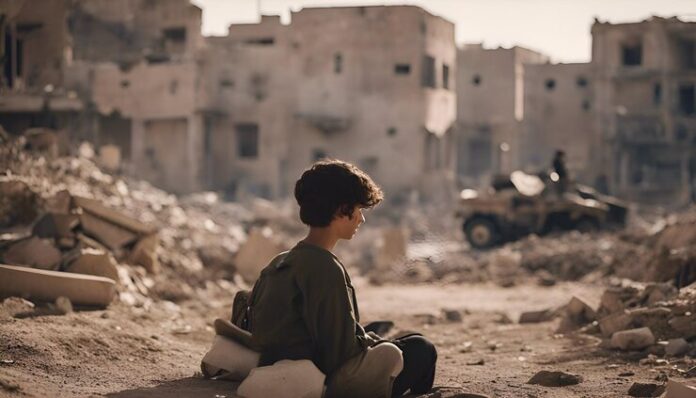Gaza, a name synonymous with conflict, resilience, and a longing for peace, holds a complex place in our world’s history. This narrow strip of land on the Mediterranean coast has been at the center of geopolitical struggles for decades, making it a focal point for global citizens who care deeply about human rights and peace. Understanding Gaza is crucial not only for its historical relevance but also for its implications on contemporary international relations and humanitarian efforts. In this blog post, we will unravel the intricate layers of Gaza’s past and present, examine the roots of its ongoing conflicts, and explore how each of us can contribute to a hopeful future for its residents.
The Historical Tapestry of Gaza
Gaza’s history stretches back thousands of years, playing a pivotal role in the ancient world as a trade hub due to its strategic location. Its significance is underscored by its mention in various historical texts and its role as a crossroads of civilizations. Over the centuries, Gaza has seen the rise and fall of empires, from the Egyptians and Romans to the Ottomans and British. Each has left its mark, contributing to the rich cultural and historical tapestry that defines Gaza today.
In modern times, Gaza’s significance has taken on a new dimension. It is a symbol of the Palestinian struggle, a reminder of the unresolved issues that continue to affect Middle Eastern geopolitics. The historical borders drawn and redrawn over the years have fueled tensions, leading to the protracted conflict we witness today. Understanding Gaza’s historical context is essential for grasping the complexities of its current situation.
Dissecting the Conflict
At the heart of Gaza’s struggles is a conflict rooted in political, religious, and territorial disputes. The Israeli-Palestinian conflict is one of the most enduring and contentious issues in modern history. Gaza, as a part of the Palestinian territories, finds itself at the epicenter of this conflict. The political dynamics are intricate, involving multiple factions within and outside Gaza, each with its own objectives and grievances.
The blockade imposed by Israel and Egypt since 2007 has severely restricted the movement of people and goods, leading to a humanitarian crisis. The blockade is a response to security concerns, primarily targeting Hamas, the de facto governing authority in Gaza, which is considered a terrorist organization by Israel and several other countries. However, this has resulted in significant hardships for the civilian population, exacerbating the cycle of violence and retaliation.
Social factors also play a crucial role. The population of Gaza is young, with over 40% under the age of 15, facing high unemployment rates and limited opportunities. This demographic pressure adds another layer to an already volatile situation, fueling frustration and despair among the youth.
The Humanitarian Fallout
Amidst the conflict, the humanitarian impact on Gaza’s residents is profound. Access to basic necessities like clean water, healthcare, and education is severely limited. The United Nations has repeatedly warned that Gaza could become unlivable if current conditions persist, highlighting the urgent need for international intervention.
Healthcare in Gaza is in a state of crisis. Hospitals and clinics lack essential medical supplies, and the ongoing conflict has resulted in a shortage of healthcare professionals. This dire situation is further compounded by the COVID-19 pandemic, which has strained the already overburdened healthcare system.
Education, a beacon of hope for future generations, is also under threat. Schools are often damaged in conflicts, and the educational infrastructure struggles to accommodate the growing number of students. Despite these challenges, the people of Gaza demonstrate remarkable resilience, with a strong desire to learn and build a better future.
The Global Response
The international community plays a decisive role in the Gaza conflict. Various countries and organizations are involved, either directly or indirectly, in efforts to resolve the issues. The United Nations, through its agencies, provides humanitarian aid and advocates for peace and stability in the region.
Some countries support Gaza through diplomatic channels and aid, while others maintain strong alliances with Israel, complicating international consensus on the issue. The geopolitical interests of these nations often influence their stance on Gaza, affecting the overall dynamics of the conflict.
However, grassroots movements and non-governmental organizations also make significant contributions. They work tirelessly to provide aid, advocate for human rights, and promote dialogue between conflicting parties, highlighting the importance of civil society in fostering change.
Toward a Peaceful Resolution
Amidst the bleakness, there are pathways to peace. Diplomacy remains a crucial tool in resolving the Gaza conflict. Recent efforts by international mediators have shown that dialogue, albeit challenging, is essential for any long-term solution. Engaging all stakeholders, including marginalized voices, is vital to create a framework for lasting peace.
Global citizens play an integral role, too. By staying informed, advocating for human rights, and supporting initiatives that promote peace, individuals can contribute to positive change. Collective efforts can exert pressure on governments and international organizations to prioritize peace and humanitarian aid for Gaza.
Education and empowerment are key components in building a peaceful future. Supporting educational programs and vocational training can provide the youth of Gaza with opportunities to escape the cycle of poverty and violence, fostering hope and stability.
A Call to Action
In conclusion, the situation in Gaza is complex, marked by historical grievances, ongoing conflict, and humanitarian challenges. Yet, amidst the adversity, there is hope. By understanding the nuances of the Gaza conflict, we can engage more effectively in conversations and actions that promote peace.
To be a part of this change, continue to educate yourself about Gaza and the broader Israeli-Palestinian conflict. Engage in discussions, support organizations working on the ground, and advocate for policies that prioritize human rights and peace. Together, as global citizens, we can help build a future where Gaza and its people thrive in peace and prosperity. If you’re seeking more resources or ways to contribute, numerous organizations and platforms offer valuable insights and opportunities for involvement.




